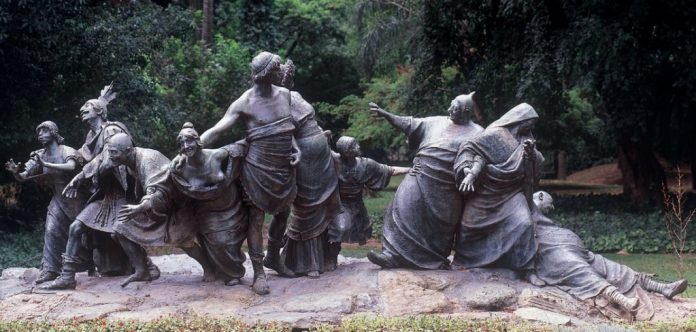Shining through the surrounding natural darkness, light and merriment bring joy to the ancient towns of the Roman Empire. This annual bliss comes from the celebration of Saturnalia, a holiday celebrating the Roman god, Saturn, the deity of agriculture. On December 8th, Jesuit rebirthed this celebration but in honor of the Latin club, or better known as the Junior Classical League (JCL). Mrs. Jones, a moderator of the club, described the festivities of the celebration: “a student toga competition, a sacrificial toy pig where the JCL officers read a fortune from the traces, a great feast for all JCL members to partake in, and games,” which help members bond in the strategy game, Risk, or harmonize in Guitar Hero. The party kicked off the upcoming year of events for JCL, helping students from all grades meet up again and meet new faces. Mrs. Jones also noted that “The officers hope to incorporate more parts of the old holiday into our rendition”.
In its ancient times, Saturnalia took place during the time of the year when the world was furthest away from the sun in its rotation cycle; therefore, Romans sought to bring some cheer into this dark and dreary season. Mrs. Druebert, the other moderator of the club, commented that “The idea was to bring more light into naturally dark days” because the dark and cold were seen as “life coming to an end.” In order to do this, Romans created a holiday to incorporate a festive spirit, including a time of “feasting, gaming, and spending time with the family, along with a reversal of order where slaves were able to dine with their masters while also being served before them.” But the holiday would not be complete without a way of thanking Saturn who made the celebration possible, so they would sacrifice a livestock and read the fortune of goodness for the coming year at the end of the celebration.
Along with preserving the festive traditions of the Classical Era, JCL helps students look to the classical past to enrich themselves in the art, language, history, and theology that would otherwise be lost. Over the past couple of years, the club has grown significantly. Senior Aidan Leahey, counsel of the officers of JCL, acknowledged that “When I was a freshman, the club started with 30 people. This year, the club totaled up to 120 students.” Aidan went on to say that the club is now the “biggest student body club within the school.” In the club, Jesuit students compete with students from different schools in the Dallas area, the state of Texas, and even the nation to show their talents in different fields of classical life, connecting with other Latin students as well. Aidan Leahey hopes not only to make JCL more known to Jesuit students but also to continue to grow the club by “hosting more meetings with the elected officers and working with other grades to see what ideas they have for the club to incorporate.”
As the end of the year approaches, much anticipation awaits next semester for the competitions in JCL. All students, along with both of the Jesuit Latin teachers, Ms. Druebert and Mrs. Jones, are ready to gear up for what is to come, ready for district, ready for state, and ready for nationals.






